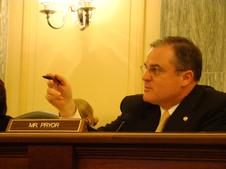WASHINGTON, DC – The Senate Commerce, Science, and Transportation Committee today held a hearing about the recent Toyota recalls and the government’s response to the problems. The following is Senator Pryor’s prepared opening remarks:
Thank you, Chairman Rockefeller for holding this important hearing. Today’s hearing is not a witch hunt; but rather an opportunity to collect more facts and perform our congressional oversight duty. It is my hope that following this hearing and the DOT Inspector General investigation, we will be able to better connect the dots and protect the millions of Americans who travel on our roads.
The recent slew of defect recalls by Toyota is certainly a cause for alarm. I hope these safety defect recalls 1) address the safety defects appropriately, and 2) are a result of a more vigilant NHTSA with a focus on the consumer. However, I remain skeptical to both points.
Disturbing new evidence developed by Committee investigators indicates that NHTSA collected data indicating an enormous spike in insurance claims and citizen reports of unintended acceleration in certain Toyota vehicles starting in 2002. We will look at these new data and discuss internal NHSTA documents regarding the subsequent NHSTA investigation. These and other documents are not conclusive but require that we ask questions about when and what NHTSA knew, what they did or did not do with the information and why.
Additionally, I question whether NHTSA is prepared to deal with certain defects that are not mechanical in nature. Today’s new evidence at least suggests the possibility that Sudden Unintended Acceleration in Toyotas may be caused by the software or the electronic throttle control systems. Yet it has become increasingly clear that NHTSA does not have the expertise in identifying such defects and remedying them. I am also concerned about the coziness of NHTSA’s relationship with the industry it is tasked with overseeing. While consumer’s have taken their responsibility to report problems seriously, we need to ensure that NHTSA has not been lax or resource-deprived, or both.
At the same time, Toyota has not admitted to a prevalent software problem or identified a solution to it. The issue of Sudden Unintended Acceleration in today’s vehicles merits a deeper probe by safety investigators and the industry as a whole. Without question, this problem should be further investigated and fail-safe systems should be considered for all automobiles.
I’m sure we will learn much through today’s hearings, and I look forward to hearing from our witnesses. As they say, “Those who do not learn from history are doomed to repeat it.” After the investigations and hearings, I believe we will have a clear picture as to where the failures occurred. This will allow us an opportunity to put in place stronger consumer safeguards. We can apply lessons learned and make the necessary improvements to our recall system as we reauthorize NHTSA in the upcoming Surface Transportation Bill.







